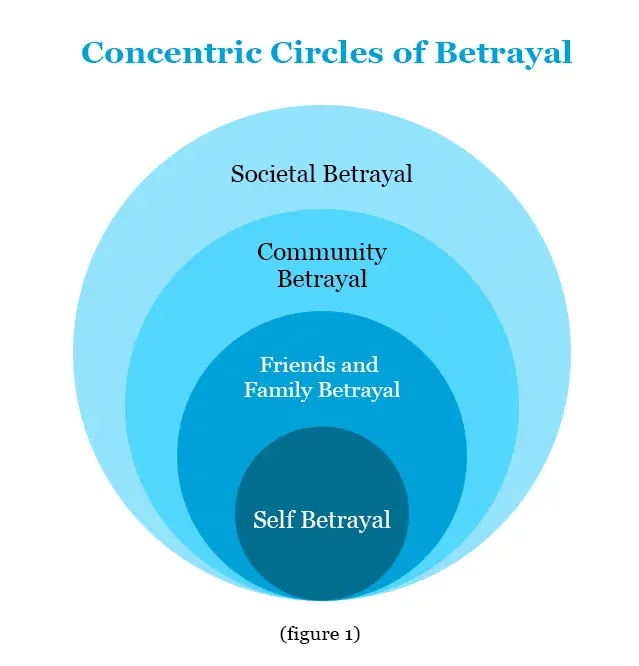People can’t handle having the rug pulled out underneath them by people they love and trust. That does them in, you know. It makes them ill. It hurts them. Psychophysiologically, it damages them.
Jordan Peterson
When you Think of a Wholesome Life Journey, What Image Comes to Mind?
I imagine it as a comfortable drive on a wide country road, with friends and family by my side and the sun smiling at us through a clear blue sky.
To be honest though, life is experienced more like a journey by boat on an unpredictable sea. One can go from smooth sailing to turbulent waters, to life threatening storms over the course of one’s lifetime, and sometimes within a day. At times, we move towards our destination as planned and at other times we feel lost at sea.
One important element that determines the quality of our lives as we chart these uncertain waters is the quality of the company on this journey. There are times when they help us navigate the challenges and join us in enjoying the scenery, while at other times they leave us with holes in our boat, threatening to sink it.
As we all know, human relationships can play both a supportive and detrimental role in our lives. Research clearly indicates that supportive relationships are a core component in our resiliency, that is, our ability to bounce back from adverse experiences.
If we were blessed with a generally stable childhood, then in our early years we learn to trust and rely on our caregivers and are quite confident we will get our needs met. We also learn that things work in a certain way, for instance, if we cry, someone will respond to us.
We are raised to believe that starting from our homes, people are generally good-natured and cooperative. That there are reliable people out there who we can reach out to when needed: Parents are providing, protecting, nurturing and guiding; teachers are imparting knowledge; leaders are leading with a vision; doctors, nurses, therapists, spiritual guides are healing; soldiers, police, judges are protecting society and rights of all citizens fairly; businesses and their employees are providing us quality consumer products and services and so on. It’s a system of trust. And we start by assuming the system is sound and balanced.
We also rely on ourselves. We begin by trusting our hands and feet to take us to mom or dad, or to get our favorite toy. We eventually learn to rely on our physical abilities and mental faculties to get things done for ourselves and others. We learn to feel empowered and in control. Ready to take on the world.
And as life is, sooner or later, we feel deceived when this trust is broken in some way. One of the earliest violations of trust can be by a caregiver in the form of abandonment or neglect of basic needs, or through psychological, emotional, or physical abuse. When neglect or abuse is experienced in childhood, the cognitive, sense-making part of the brain has not come online, so the child can’t make sense of it and often absorbs this break of trust at a visceral level.
In fact, they may struggle with this inner pain as adults until they can look at it with the right person within a safe, supportive environment. Over the course of our lives, we may experience numerous other forms of betrayal.
When my life as a young person was overturned with a major loss, it changed the whole trajectory of my life. That one loss opened to me a whole different set of experiences. And while I experienced the support of many, I also got lesson after lesson on how people betray you, something I was not exposed to earlier.
These series of confusing and hurtful experiences began in the more impersonal outer circles and moved inwards with people I loved, to finally ending on me. It ended with the surprising realization of how I too was unintentionally betraying myself.
I have conceptualized these layers as concentric circles and what I term as “Concentric Circles of Betrayal” (figure 1). Let me explain this concept.

In one way or another all of us have felt deceived whether by those close to us or those we don’t know but trusted. In the outermost circle is society at large. One may feel betrayed by systemic and cultural oppression enforced by society. Discrimination and injustice may be embedded in the social fabric which means the systems are biased against certain weaker segments of society.
People may find themselves exploited by corrupt public position holders misusing the power and privilege bestowed on them. Also, certain things we witness in our public life, like bystanders just looking on as a crime is committed, can be felt as a break of societal trust.
Then there is the circle of people we know, the neighbors in the community we live in, the colleagues we work with, the extended family we relate with. How many times do we experience the significant and insignificant ways in which people are dishonest with us—A colleague who will try to take credit for your work to the neighbor who will gossip about you.
Finally, there are those we call our own. Our close relationships—friends, family, spouse and children we may trust our very life with. You think other than small breaches of trust, nothing can go wrong here. But sometimes you learn that when they had to choose between you and what they want, they chose themselves, instead of finding mutually satisfying solutions.
Or your spouse has an affair, a close friend double-crosses you out of envy, a parent consistently takes you for granted, a sibling lies to you, a child is disrespectful towards you. The closer you felt, the more you trusted, the deeper the cut of betrayal.
There are countless examples of how we may feel betrayed in ways big and small, by those that matter and those that don’t. Eventually we learn to accept it as part of life. ‘That’s just how humans are, they can’t be trusted,’ we tell ourselves. Some of us, unfortunately, become what we once disliked—we too become uncaring, irresponsible, and selfish. While others, after being deeply scarred and disoriented from betrayal after betrayal, become so traumatized that they find themselves in a quagmire of endless crippling thoughts, emotions and behaviors.
There’s yet another circle of betrayal which is, arguably, the most important one. Within your own psyche you will find the innermost circle of betrayal. Let me be clear, by this I do not imply that we are to blame for the ill treatment we experienced by others. Nor is it a denial of all the pain endured. Instead, it’s an invitation to turn our gaze inwards and examine our responses to life. For many people this is counterintuitive, especially when they view the whole problem as being external to them.
Yet when we look inside, we may be astonished to find the many ways in which we are adding to our problems and suffering, the ways we let ourselves down and ended up living inauthentically. This can be viewed as self-betrayal.
As a result of upbringing, our temperaments, adverse life experiences and relational traumas, we may have acquired beliefs and behaviors that don’t serve us well. We may be living a life incongruent with our core values. We may lack meaningful goals. We may have trouble managing our emotions, allowing them to overwhelm and control us. We may not be familiar with healthy boundaries or how to set them. We may have simply lost ourselves in all the chaos, pain and confusion. Or we may have never followed through on the promises we made to ourselves.
The inner journey for each of us is as unique as our outer journey. The external storms will come and go, but until we learn to examine our inner world, we can’t navigate life in ways that give us confidence that we are being true to ourselves, that we didn’t betray our existence. This allows us to live with self-accountability and integrity. We must work with our internal state before we can work with the external with any kind of clarity and efficiency.
Your resilience depends on what you do with the many hits you will take in life. Will you unconsciously contribute further to what feels like a betrayal, or will you take a more conscious approach to restoring well-being and growing from life experiences? Are you going to give your energy to constant complaining and attending to negativity or work towards alleviating your problems?
It’s not just about what happened to you but also about what you choose now for yourself as you take personal responsibility for your life moving forward.
Taking ownership for our own healing and well-being is a daunting task. It tends to make the ego feel uncomfortable. Yet once you take it upon yourself to rebalance the inner imbalance you will see things will start to repair—starting inwards from your own healing, and then going outwards to your close relationships and community at large. Developing a healthy core to operate from will go a long way.
But you must take the initiative and be proactive in your own recovery. You must make the intention to take the first step!
God changes not what is in a people, until they change what is in themselves.
Quran (Surah 13, verse 11)


